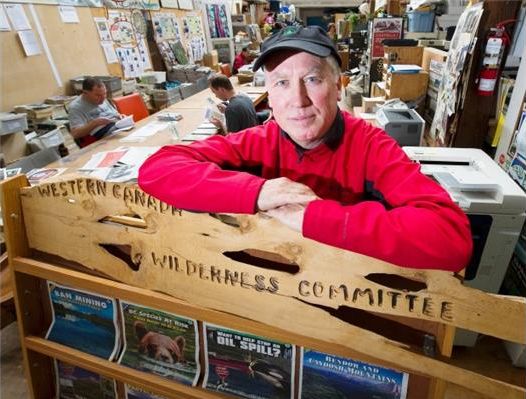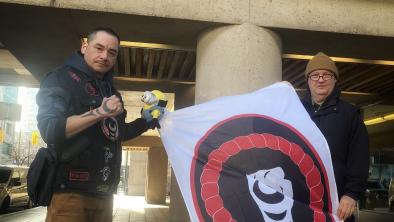Green gets mean with federal Conservatives
Vancouver Sun

Discord between the Tories and environmentalists began when the federal natural resources minister maligned environmental groups as radicals. It escalated with the introduction of Bill C-38, a package of new laws, some directly targeting charities and environmental protections.
Now it’s war.
Environmental groups are fighting back after the Conservatives accused them of hijacking public decision-making and using foreign funding to damage national economic interests. Their target is Bill C-38 which opponents say weakens fish habitat protection and strengthens the taxman’s powers to question charities.
The changes will bring more scrutiny to foreign funding for charities and also how they use money for political purposes. Charities will also have to take more responsibility for the political activities of groups to which they give money.
It will give bureaucrats new powers to suspend the charitable status of groups, a designation that helps organizations raise money by allowing them to issue receipts for tax deductions.
And Bill C-38 will give an extra $8 million to the Canada Revenue Agency for stepped-up audits of those groups.
Now that Prime Minister Stephen Harper has a majority, his government will be able to push through the new laws before parliament breaks for the summer.
Environmental organizations that operate in B.C. are fearful of the changes, but not cowed.
They say they will continue to speak against projects that would carry Alberta oilsands crude to the B.C. coast, including Kinder Morgan’s proposed $4.1-billion Trans Mountain pipeline expansion to the Lower Mainland and Enbridge’s $5.5 billion Northern Gateway pipeline to Kitimat.
“We don’t take it when we are bulldozed,” says Wilderness Committee director Joe Foy, an environmental campaigner with nearly 30 years of experience in B.C.
The Wilderness Committee recently joined more than 500 organizations in launching a nationwide campaign to get the public to speak out against Bill C-38 and lobby their MPs to do the same. Of major concern are amendments to the fisheries act that limit federal protection of fish habitat to commercial, sport or aboriginal fishing, a change from the current sweeping protection that makes destruction of any fish habitat an offence.
The pushback shouldn’t be surprising given British Columbia was the birthplace of groups such as Greenpeace, now in its fourth decade, which claims three million members worldwide.
Greenpeace Canada had its charitable tax status stripped in 1989 for being too political, but it soldiered on. Greenpeace recently signalled it’s ratcheting up its campaign against the Alberta oilsands and tankers by hanging an anti-pipeline banner from the Lions Gate Bridge.
“The future belongs to [environmental] groups that are bold,” said Will Horter, executive director of the Dogwood Initiative which has been fighting the Northern Gateway project since 2006.
Dogwood, like Greenpeace, can afford to be bolder than some environmental groups because it is not a charity but a non-profit society.
The Victoria-based group opposes the addition of about 200 large oil tankers a year that would be needed to ship oil from the Northern Gateway pipeline to Asia. Dogwood has helped organize rallies, worked with first nations and supported a successful federal parliamentary vote (it had no weight in law) calling for a ban of oil tankers off northwestern B.C.
In 2011, the group plastered downtown Vancouver with posters that pictured a black tanker. When it rained, the water-soluble ink bled, simulating the effect of an oil spill. Then Dogwood handed out more than 250,000 black “notanker.ca” decals that supporters stuck onto one-dollar coins, turning them into an oil-scarred loonie.
In a program it dubbed mob-the-mic, Dogwood signed up more than 1,600 participants to speak out against the Northern Gateway project during National Energy Board hearings underway now.
This infuriated Natural Resources Minister Joe Oliver who wants to limit interveners to people directly affected by the project.
Political scientist Marco Navarro-Genie said groups like that have pushed too far already. The research director at the right-wing think-tank Frontier Centre for Public Policy is not surprised the federal government has decided to put a halt to some environmental group’s “incendiary” influence on the public policy debate.
“There seems to have been a greater deal of sympathy among the public and media for a little bit of the radical edge [of environmentalism]. It seems to be based on the notion that you have to push the envelope to get somewhere,” said Navarro-Genie, also a professor at Mount Royal College in Calgary.
“That basically throws out the window any kind of [common sense] conversation about the environment. I think [environmental groups] have done damage to themselves and their cause.”
In the hope of shutting down attacks it deems too political, the Conservatives’ proposed tax measures could lead to reduced funding for groups like the Dogwood Initiative. Under the existing rules, charities can give money to other groups without having to determine whether it will be used for political activity. Dogwood gets 60 per cent of its annual funding — just under $600,000 — this way from charitable foundations in Canada and the U.S.
But the proposed changes will force Canadian charities to count the political activities of the groups they give money to as their own.
According to the Canada Revenue Agency, charities can now pursue political activities to retain, oppose or change the law or decision of any level of government, inside or outside Canada, provided the activities are non-partisan, related to its charitable purpose and limited to 10 per cent of its total budget. For example, as long as charities stay under the 10 per cent limit, they can buy a newspaper advertisement to pressure the government, organize a march to Parliament hill or hire communications specialists to arrange a media campaign.
Charitable groups cannot support political parties or candidates.
When Bill C-38 is passed, charities that grant money to other groups would likely reach their 10-per-cent limit more quickly and that means less money for groups using funds for political activities, says Paula Boutis, a lawyer and president of the Sierra Club of Canada.
“It’s astonishing to me,” said Boutis.
The Conservative government’s main target appears to be Tides Canada, a Vancouver-based registered charity and non-profit foundation.
It had a program budget of more than $13 million in 2010, about half of which it granted to other groups ranging from the Canadian Red Cross and the Sauder School of Business at the University of B.C. to West Coast Environmental Law.
The other half of its budget went to 40 initiatives under Tides’ direct responsibility, including projects to preserve areas of Canada’s boreal forest, protect wild salmon on B.C.’s coast and provide services in the East Scarborough neighbourhood in Metro Toronto.
Earlier this year, Tides Canada defended itself before a Senate committee, where Conservative senators pressed the organization on why it was using foreign funds to oppose the oilsands.
Tides Canada is the only group being audited by the Canada Revenue Agency among 11 environmental and charitable groups interviewed by The Sun.
The organization has received about $60 million from U.S. foundations since its inception 11 years ago.
Other Tides Canada funding comes from individuals, families, businesses and Canadian foundations.
In 2011, only three per cent — or about $600,000 — of its grants went to groups that worked on causes that had anything to do with pipelines or oilsands, said president Ross McMillan.
“It’s just assumed we’re this massive flow-through entity channelling funds through to anti-oilsands or other causes, when nothing could be further from the truth,” said McMillan.
Less than one per cent of Tides’ funding is spent on political activities, he added, well under the 10-per-cent threshold.
But already one of Tides Canada’s most controversial initiatives, ForestEthics, has become a victim of the pressure from the federal Tories.
The high-profile group has been in the headlines over the last decade for convincing office supply giants to move away from paper made from endangered forests. ForestEthics severed ties from Tides Canada last month to ensure Tides did not lose its charitable status, said Valerie Langer, who is heading up one of two new ForestEthics organizations. One ForestEthics group will act as an advocacy group and another as a solutions group that will seek charitable status.
David Suzuki has also stepped away the foundation he helped create to distance himself from any concerns over his advocacy work.
The David Suzuki Foundation received only six per cent of its funding from foreign sources in its last fiscal year and allocates less than one per cent of its resources on political activities, said its CEO Peter Robinson.
“The [federal government] has deliberately targeted a sector and put it squarely into the media, making unfounded wild accusations with the intent of diminishing that voice just as they are about to do large-scale energy projects which include exploration in the Arctic and pipelines,” said Robinson.
The real tragedy is the country is losing a “diversity of voices” which is the mark of a mature society, added Robinson. “[Those] voices always lead to stronger outcomes,” he said.
West Coast Environmental Law says 80 per cent of its funding comes from Canadian sources and they spend less than five per cent of their resources on political activities.
“The fact that our federal government is trying to silence us should be disturbing to all Canadians,” said executive director Jessica Clogg.
The Canada Revenue Agency will not disclose which charities it audits, so it’s difficult to tell if environmental groups are being targeted.
CRA spokesman Philippe Brideau noted an overall audit will determine compliance on political activities, not just the 10 per cent threshold.
On the other side of the political spectrum, the free-enterprise think-tank Fraser Institute has been audited three times, the last time in 1998. Two audits took place under Jean Chretien’s Liberal government, the first under Brian Mulroney’s Progressive Conservative government.
If there is another audit, Fraser Institute president Niels Veldhuis is not worried.
He said they don’t consider any of their work to cross the line into political activity and would expect to pass any future audit.
The Fraser Institute gets about 11 per cent of its funds from international sources and spends 30 per cent on international programs, said Veldhuis.
Despite environmental groups’ fears about what the new measures will mean, the Conservative government’s attacks have had the “unintended consequence” of increasing interest in environmental causes, said Pembina Institute executive director Ed Whittingham.
Of the eight environmental groups interviewed by The Sun, six, including the Dogwood Initiative, said their individual donations are up.
Quipped Whittingham: “I’m not sure if the prime minister’s office intended more Canadians to be concerned about the environment after their attacks.”


